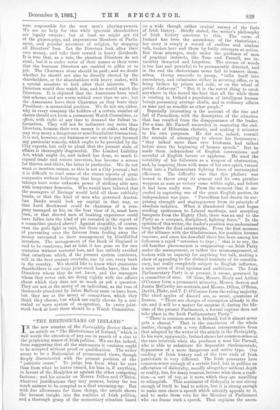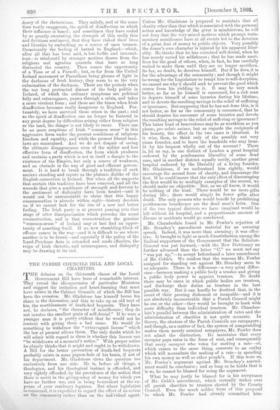"THE RHETORICIANS OP IRELAND."
IN the new number of the Fortnightly Review there is an article on" The Rhetoricians of Ireland," which is well worth the attention of any one in search of a clue to the perplexing mazes of Irish politics. We are far, indeed, from suggesting that all the statements it contains ought to be accepted without proof or qualification. The writer seems to be a Nationalist of pronounced views, though deeply discontented with the present position of the "patriotic cause." To judge. less. from what he says than from what he leaves unsaid, his bias is, if anything, in favour of the Healyites as against the other competing factions ; and his attacks on Messrs. Dillon and O'Brien, whatever justifications they may possess, betray far too much animus to be accepted as a final summing-up: But with due allowances for these things, the article shows the keenest insight into the realities of Irish politics, and a thorough grasp of the momentary situation based on a .wide. though rather cynical survey of the facts of Irish history. Briefly stated, the writer's philosophy of Irish history amounts to this. The curse of Ireland has been the ascendency of the rhetorician ; her story is simply a record of endless and aimless talk, broken here and there by futile attempts at action. But these attempts, made under the guidance of men of practical instincts, like Tone and Parnell, are in- variably thwarted and forgotten. The stream of words is too fast and powerful to be permanently diverted, and in the end the rhetoricians never fail to reassert them- selves. Group succeeds to group, "talks itself into ascendency, and culminates either in securing office, or in being broken by prison and exile, or on the wheel of public disfavour." "But it is the rarest thing to catch anywhere in this record the hint that all the while there is existing in Ireland a population of intelligent human beings possessing average skulls, and in ordinary affairs as sane and as sensible as other people." Especially interesting is the account of the rise and fall of Parnellism, with the description of the situation that has resulted from the disappearance of the leader. For a time Mr. Parnell succeeded in mastering the end- less flow of Hibernian rhetoric, and making it minister to his own purposes. He did not, indeed, commit the mistake of attempting to silence his lieutenants ; "they talked more than ever Irishman had talked before since the beginning of human speech." But he made them independent of English conventions and scornful of English favour or applause. He used the volubility of his followers as a weapon of obstruction, and, by inspiring them with some of his own spirit, turned them into a Parliamentary fighting force of unexampled efficiency. The difficulty was that this phalanx was bound to throw away its armour and its own peculiar weapons as soon as victory came within sight, and before it had been really won. From the moment that it suc- ceeded in capturing one of the great English parties, its independence was gone. " Parnellism had drawn its sur- prising strength and staying-power from its principle of absolute isolation. When it abandoned that, and began sending spokesmen to Liberal meetings, and accepting banquets from the Eighty Club, there was an end to the Party as a compact, disciplined, fighting force." In the opinion of this writer, the leader's position was undermined long before the final catastrophe. From the first moment of the alliance with the Gladstonians, his position became insecure, and since his downfall there has been among his followers a rapid "reversion to type ; " that is to say, the old familiar phenomenon is reappearing—an Irish Party under the management, or rather the mismanagement, of leaders with no capacity for anything but talk, making a show of appealing to the disloyal instincts of its constitu- ency, but really completely subject to English influence, a mere arena of rival egoisms and ambitions. The Irish Parliamentary Party is at present, it seems, governed by a committee of nine. Of these, Messrs. Healy and Arthur O'Connor form a permanent minority, Messrs. Sexton and Justin McCarthy are neutrals, and Messrs. Dillon, O'Brien, Davitt, Blake, and T. P. O'Connor form the ruling majority. The chief apples of discord are, as usual, questions of finance. "There are charges of corruption already in the air, and it will be a matter for surprise if, during the life- time of the present Parliament, a formal rupture does not take place in the Irish Parliamentary Party." "There is common-sense in Ireland, but it almost never gets a chance." That is the conclusion of the whole matter, though with a very different interpretation. from that adopted by the writer of the article in the Fortntghtly. In his view, apparently, Ireland shows her common-sense at the rare intervals when she produces a man like Parnell, who is able to substitute for Separatist .rhodomontade, Separatism of a more dangerous and active type. Our reading of Irish history and of the true ends of Irish patriotism is very different. The Irish peasantry have common-sense enough of a certain kind, but in politics an affectation of disloyalty, usually altogether without depth or reality, has, for many reasons, become with them a tradi- tion—a sort of toy, as it were, which they are unwilling to relinquish. This sentiment of disloyalty is not strong enough of itself to lead to action, but it is strong enough to make men cheer a speech which adroitly appeals to it, and to make them vote for the Member of Parliament who can frame such a speech. That explains the aseen- dency of the rhetoricians. They satisfy, and at the same time vastly exaggerate, the spirit of disaffection on which their influence is based ; and sometimes they have ended by so greatly overrating the strength of this really thin and fictitious sentiment, that they have risked their lives and liberties by embarking on a course of open treason. Occasionally the feeling of hatred to England—which, after all that has been said, is but feeble and intermit- tent—is reinforcdd by stronger motives drawn from the religious and agrarian quarrels that have so long distracted the country. Then comes the opportunity of a Tone or of a Parnell ; but, so far from the United Ireland movement or Parnellism being gleams of light in the darkness of Irish history, they seem to us the very culmination of the darkness. These are the periods when the too long protracted disease of the body politic in Ireland, of which the ordinary symptoms are political folly and extravagance, passes through a crisis, and takes a more virulent form ; and these are the times when Irish disaffection becomes really dangerous to England. For- tunately, we have survived these crises in the past ; and as the spirit of disaffection can no longer be fostered in any great degree by difficulties arising either from religion or the land, the danger is not likely to recur. There can be no more eruptions of Irish common sense" in this aggressive form under the present conditions of religious freedom and equality, and while the present liberal land. laws are maintained. And we do not despair of seeing the ultimate disappearance even of the milder and less effective form of disaffection, the form which produces and sustains a party which is not in itself a danger to the existence of the Empire, but only a source of weakness, and an obstacle in the way of good and efficient govern- ment. It is hard to break through a tradition of such ancient standing and repute as the platonic dislike of the English connection in Ireland. But when all the supports that sustain this tradition have been removed, and all the wounds that give a semblance of strength and fervour to the sentiment of disloyalty have been healed—and it would not be unreasonable to claim that this happy consummation is already within sight—history deceives us if we cannot look for the rise of a new and better feeling. The Irish party is at present passing into that stage of utter disorganisation which precedes the usual reconstruction, and in that reconstruction the genuine " common-sense " of Ireland may at last find an oppor- tunity of asserting itself. If no new stumbling-block of offence comes in the way—and it is difficult to see where another is to be found—and especially if the policy of the Land-Purchase Acts is extended and made effective, the reign of Irish rhetoric, and extravagance, and disloyalty may be drawing to its end.







































 Previous page
Previous page